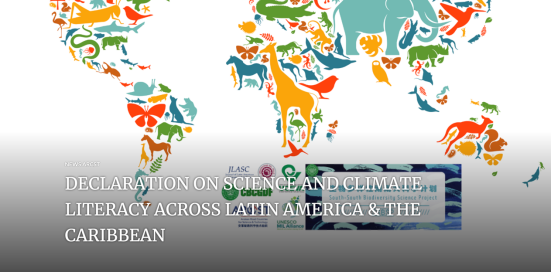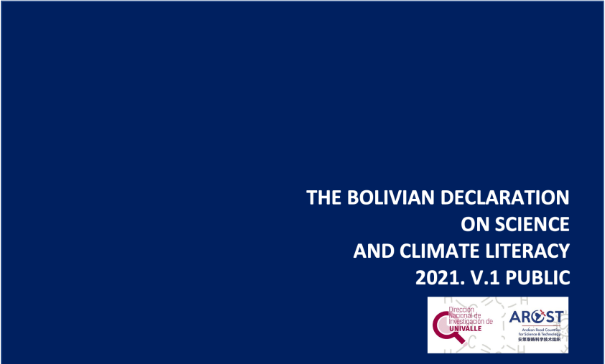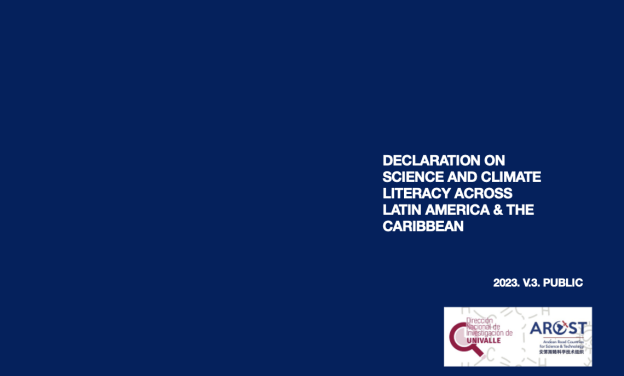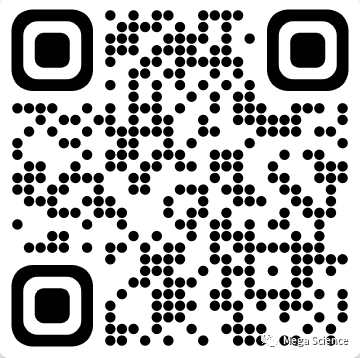
Source: Journal of Latin American Sciences and Culture
During the "1st Annual Meeting on Science Literacy 2021 (AMSL): A prerequisite for stimulating climate change engagement" (https://journalasc.org/annual_meeting/) organized in November 2021, several institutions and organizations from different fields around the world that include research, academia, education, innovation, and technology, agreed on the “Bolivia Declaration on Science and Climate Literacy.” This event marked the beginning of the Science Culture Construction (SCC) in Latin America and the Caribbean. The SCC has the mission to promote the development of science and technology in harmony with nature. To improve the public science literacy, climate literacy, biodiversity science, green science, and the green development to ultimately create a better future for the whole of human society.

First version of the declaration. Source: Journal of Latin American Sciences and Culture
Since 2021, periodic updates to the declaration have been done, generating v2. Following this tradition, here we present the final version, v3:

Final version of the declaration. Source: Journal of Latin American Sciences and Culture
DECLARATION ON SCIENCE AND CLIMATE LITERACY
ACROSS LATIN AMERICA & THE CARIBBEAN (V3.)
January 28th 2023
(full text)
Preamble
Science has long been a tool for developing bilateral and multilateral relationships. However, the definition and applications of science literacy have broadened considerably in recent years. This conceptual broadening coincides with the growing understanding that science and technology underpin many of the challenges and opportunities that current societies face, whether as a driver or a potential solution. Integrating science to advance national interests and tackle shared global challenges is an appropriate response.
In this context, during the “1st Annual Meeting on Scientific Literacy 2021: A prerequisite for stimulating climate change engagement” celebrated on the 27th of November 2021, several experts from around the world discussed the present and future of climate literacy, its fundamental role in addressing global challenges, and the requirements to harness its full potential in the Latin American and Caribbean regions and beyond.
As a result of these fruitful discussions, the “Bolivia Declaration on Science and Climate Literacy” in its first version (v1) was signed by a group of high-level experts who contributed to the annual meeting. It proclaims a shared vision of science literacy in the future, emphasizes the benefits it can bring to tackling the global challenges of our time, and outlines the principles needed to foster science and climate literacy. That version has been updated into v2 and v3, valid from 28th January 2023.
Vision
The third version of the “Bolivia Declaration on Science and Climate Literacy,” re-launched on 28th January 2022, aims to foster agreement and raise awareness about the need to strengthen science literacy strategies and practices worldwide to support universal scientific values. These strategies must suitably include science and technology as crucial dimensions at different levels. This confluence of interests must benefit both the scientific endeavor and legitimate broader societal objectives.
In the context of this Declaration, Science Literacy is understood as a series of practices at the intersection of science and technology. The renewed interest in scientific literacy comes in response to identified challenges at the interface of science and foreign policy, where a more extraordinary scientific voice could both add value to bi- and multilateral discussions and decisions about our shared global concerns. Joint science literacy objectives are possible where actors converge around such common challenges. Therefore, science literacy goes beyond international collaboration, as it tackles interests beyond scientific ones and may directly or indirectly serve to advance sustainable development goals. The first annual meeting highlighted the growing importance of science literacy on a global level. One crucial role of science literacy is building bridges between science, technology, innovation practices, national and regional interests, and global challenges.
We firmly believe that:
Science literacy is often not fully exploited at all levels
More explicit science literacy strategies at national and supranational levels would allow for a more effective alignment of interests and more efficient coordination of resources.
Benefits of Science Literacy
We firmly believe that the potential of science literacy is yet to be fully realized. It includes:
Endeavors to address global challenges (climate change), biodiversity conservation, and wetlands restoration, among others. Science and Technology, with other tools, facilitate the identification of shared global challenges. Coordinated scientific efforts can help to address global challenges. The relationship between global challenges and scientific practices goes both ways. Efforts to achieve the “Sustainable Development Goals” exemplify how global challenge-related policy-making and scientific research must be in constant dialogue.
Better conditions for scientific activities due to the contribution of foreign policy agendas. With the scientific community's support, literacy has a particular role in implementing more significant scientific initiatives and projects (e.g., research infrastructures, joint programs, etc.).
Improved interfaces between science and public policies. Science literacy can contribute to eliminating cultural, sectoral, and knowledge barriers between actors such as policy-makers, researchers, and civil society.
Principles to foster Science Literacy in Latin America & the Caribbean
Value for citizens: governments, diplomats, and researchers are encouraged to acknowledge and demonstrate science literacy as a fundamental and universal tool to improve international relations.
Methodological diversity: consider explicit and implicit types of science literacy. This involves acknowledging that not all relevant science literacy practices are labeled as such. Putting the science literacy label on a project, program or policy is a strategic choice.
Demonstrable impact: the potential positive effects of science literacy need to be measured and recognized. At the same time, unintended side effects may need to be acknowledged and assessed. Public policies not relating to science literacy may also have unintended effects in the realm of science literacy.
Evidence-informed: in foreign affairs-related policies in relevant areas. This knowledge can be content-related (e.g., scientific evidence on climate change, global inequality, cyber security), context-related (e.g., knowledge about a specific innovation system), or process-related (e.g., evaluative knowledge on the effects and the outcome of science literacy interventions).
Collaboration and inclusion: science literacy is a multi-actor effort in which diplomats, scientists, and science managers, as well as other non-state actors, can have a role and can contribute to its deployment. This applies at the local, regional, national, and international levels. This innovative model brings new governance and coordination mechanisms that must be managed in dialogue with all stakeholders.
Capacity building: All stakeholders involved in science literacy will benefit from exchange and suitable capacity-building activities. Therefore, cutting-edge, interdisciplinary, intergenerational, interactive training modules are needed. These will enable public officials and scientists to cooperate efficiently, strengthening future science literacy.
Independence of science: science is a handy tool for addressing global challenges and improving international relationships as long as ideological goals do not distort it.
The declaration intends a genuinely global reach. If you would like to sign it as well, send your name, affiliation, and motivation to sign to editorial@journalasc.org or scan the following QR code and fill the form.

Click here to fill the form
Assistant Editors: Shantel Guillaume, Kornikova Zakharenko, Yvonne Li, Yajie Zhao.
References
1. https://journalasc.org/annual_meeting/
2. https://revistas.univalle.edu/index.php/jlsc/article/view/191/197
3. https://journalasc.org/2023/01/25/science_lac/
4. https://onlinemac.wixsite.com/arcs/post/the-first-annual-meeting-on-science-literacy-2021
5.https://www.ubu.es/sites/default/files/portal_page/files/agenda_27th_november_1er_congreso_de_ciencia_y_tecnologia_2021.pdf
6. http://www.cbcgdf.org/English/NewsShow/5008/21612.html
7. http://z.cbcgdf.org/nd.jsp?id=580&_sc=3@Mark
8. http://www.cbcgdf.org/English/NewsShow/5008/21612.html
9.https://journalasc.org/2022/11/17/international-green-science-academy-network-igsan-an-initiative-of-the-south-south-biodiversity-science-project/
10.https://journalasc.org/2022/11/17/the-world-green-science-day-for-and-with-society-09-12-2022-concept-note/
11. http://www.cbcgdf.org/English/NewsShow/5012/22064.html
12.https://journalasc.org/2022/11/17/welcome-to-the-first-ever-celebration-of-the-world-green-science-day-wgsd/
Editor: Daisy
Contact: v10@cbcgdf.org; +8617319454776

Contribution
Do you know? CBCGDF is a non-profit organization. We rely on crowd-funding and donations. You have the opportunity to help us to advance biodiversity conservation. Donate TODAY to power up the movement to make it a better world for all life.
https://www.paypal.me/CBCGDFChina
http://www.cbcgdf.org/English/ConfirmDonaTion/0.html
